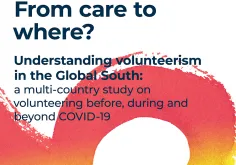When the world needed them, volunteers stepped up. This is clearly shown in a recent UNV-Gallup study on volunteering and COVID-19. They key findings are being published for the first time in UNV’s new paper "From care to where? Understanding Volunteerism in the Global South: A multi-country study on volunteering before, during and beyond COVID-19".
As part of the next State of the World’s Volunteerism Report, UNV commissioned a study based on original multi-country quantitative data to understand patterns of volunteer participation during the global COVID-19 pandemic, volunteer motivations and experiences, and what these might mean for people’s voluntary participation in the remainder of the Decade of Action.
For this study, nationally representative surveys with more than 8,000 people were conducted in eight countries - Bolivia, India, Kenya, Lebanon, Senegal, Thailand, Turkey and Uzbekistan – between March and April 2021.
The study clearly shows that when the world needed them, volunteers stepped up: more than three quarters of adults across the eight countries said that they had participated in volunteering activities over the past year. In countries like Kenya, Senegal and Uzbekistan, almost all adults had volunteered in some way. Volunteering levels were high across all demographic groups, whereas men volunteered slightly more than women. Most people volunteered informally directly in their communities, but a significant number of people also volunteered through government programmes and campaigns.
However, volunteering levels were clearly affected by the pandemic, for example by lockdowns, individual circumstances, and different volunteering opportunities. In some countries, volunteering declined while in others it increased during the pandemic. There is no clear pattern across different countries and groups, although unemployed people were likely to volunteer less than in previous year, possibly because they struggled to meet their own basic needs.
However, there is one strong feature when it comes to changes in volunteering during the pandemic: Volunteering in the form of civic engagement – attending neighbourhood meetings or contacting public officials to provide feedback and improve services – took a clear hit in 2020. This is most likely linked to pandemic-related restrictions that limit face-to-face meetings. However, more data is needed on is needed on why civic participation declined so significantly in some countries rather than others.
Despite the devastating impacts of the COVID-19 pandemic, people make plans to volunteer more this year – although this varies from country to country. Most people plan to engage in a variety of different volunteering activities, most commonly by directly helping their friends and neighbours.
Bigger shifts are likely to happen towards forms of volunteering that give people greater ownership of development processes. People are especially planning to engage in some form of participation, for example by giving feedback to authorities, or working with authorities to plan services – particularly in countries where this was less common in the past.
These findings serve to remind policymakers that the economic and social value of volunteering goes beyond the labour provided and services delivered. Volunteering is an important channel for people to help shape countries’ pathways out of the pandemic and beyond.
The results of this study are discussed in more detail in UNV’s newly published paper “From care to where? Understanding Volunteerism in the Global South: A Multi-Country Study on volunteering before, during and beyond COVID-19”. The paper will form the basis for a chapter of the next State of the World’s Volunteerism Report.

